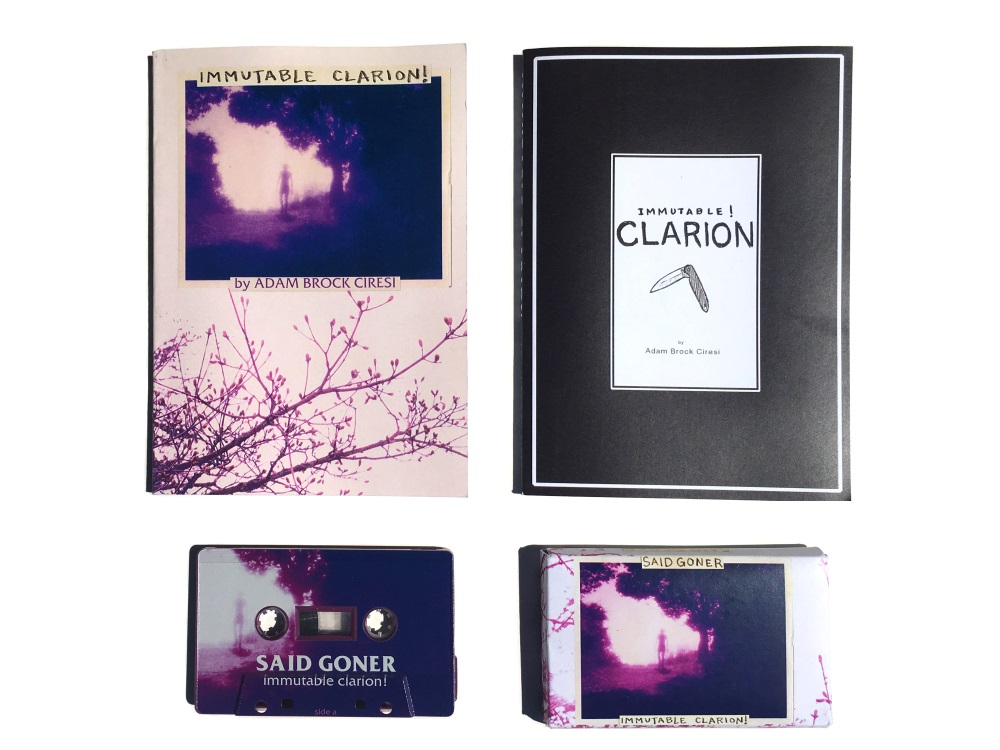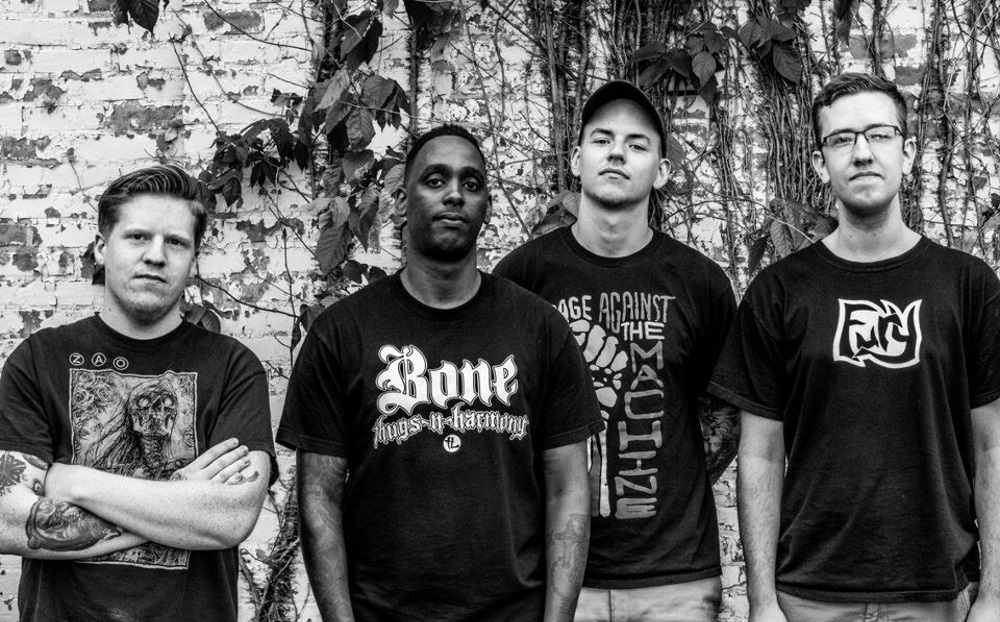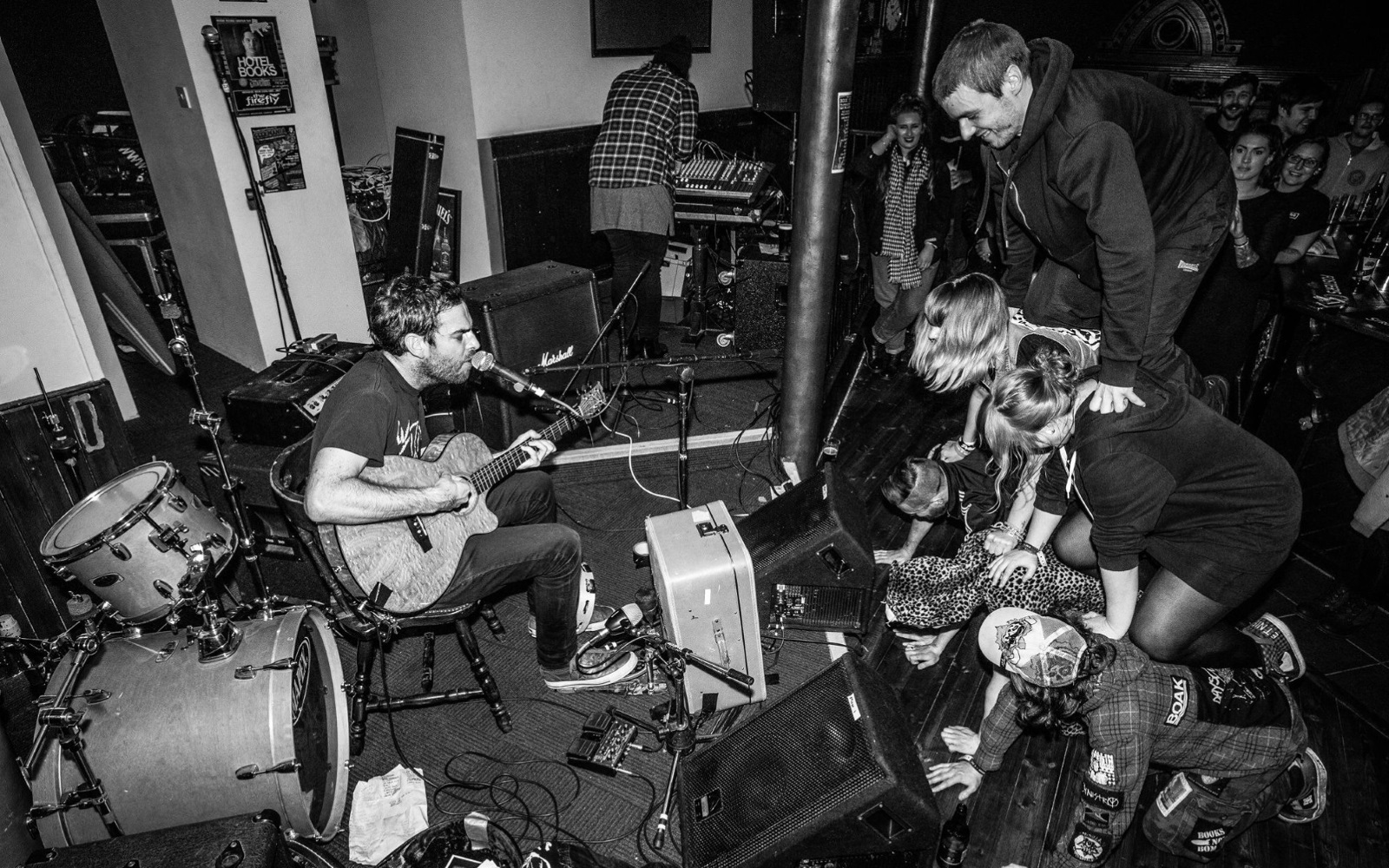Combined with an interesting 85 page chapbook dealing with the themes of its mother album, “Immutable Clarion”, the newest independent-spirited album from Portland artist Adam Ciresi (aka SAID GONER / see our video interview HERE) is a magnetic collection of deftly made songs that drift elegantly and dreamily between acoustic indie, sensitive alt rock and lazy, bedroom folk. The record proves that Adam is not only more than capable of penning a good tune, but also able to present a unique vision of intimacy, as well as socially and politically conscious lyricism. We’ve teamed up with Adam to give you the exclusive first listen of the whole thing, as well as the insightful first hand commentary on each and every track from the record.
Said Goner is the Portland, OR-based recording project of multidisciplinary artist Adam Brock Ciresi. Ciresi cut his teeth playing in hardcore and post-punk bands for years, such as Carrion Spring. In Said Goner, he combines the less aggressive timbre of ‘90s indie rock with socially, politically, and existentially engaged lyrical content. Much of the music comes in waves; these songs oscillate between explosiveness and restraint, mirroring the inevitable periods of tumult and rest we all experience in our lives.
Said Goner’s first album, Self-Title, was released in 2014 and consisted of 11 self-recorded songs that were written over a period of a few years. The project’s new, sophomore release, Immutable Clarion!, is a more focused album. Here, Ciresi’s pop song structures are flecked with little details and varied instrumentation. Thematically, Ciresi touches on his struggle living with an invisible auto-immune illness, constant mass shootings in the US, the loss of friends and loved ones, the loss of lives to an unjust police force, and the cultural homogeneity that threatens the constitution of self-identity and expression. These meditations on grief are counterpoised by moments of hope and youthful optimism, making for a record that is equal parts buoyant and melancholic.
Immutable Clarion!
This is the title track of the album, and actually the last song I wrote. It was somewhere around two-thirds of the album being recorded that the idea to write this song popped in my head. I remember lying there at the foot of my bed, staring up at the ceiling, with a little ¾-sized acoustic guitar I got for camping and road trips, lightly plucking out the notes. I thought the riff sounded better on that than my electric guitar, so I used it. I had recently finished studying in a master’s program and just completed writing my thesis, where I learned a lot about writing. A professor was insistent that an introduction should never be written until the rest of the work is somewhat finished. I decided to use a similar approach to this album. I reflected on my day, such as waking up with a feeling that I wanted to accomplish something good, I went and got coffee from a nearby market that gives out free fortune cookies that said “soon, you’ll make new friends.” The rest of the song then dives into feelings of what was coming in from the news, which at that time, was right after the protests in Charlottesville, Virginia, when someone ran over a person against the white supremacist rally.
It was terrifying news, and for a moment, I had to pause and turn to my partner to let them know how much I loved them.
Just before I finished the album, a talented musician/violinist and friend of mine, Lauren Jacobson, told me they were in town for a bit and if I had any songs for her to play on, to give her a ring. So, I did, and she recorded this within a couple of takes in my living room.
No Care
This was the first song written on the album. I wanted it to be as pop-song oriented as possible, to follow the structure and patterns of a pop song. Pop songs speak to the mainstream, and that’s what this song is about. The lyrics are about our relationship with social media, the way receive news and information, the way we perceive others and present ourselves/present others and perceive ourselves. The song ends with “don’t talk to me,” which are those moments when you intentionally turn off your phone, you leave it at home and go on a long walk, or when on a road trip your phone dies, and you leave it off for the rest of the day.
All for Want
One of the only songs on the album where I “scream,” if you could even call it that. I always want to give some context that I have almost 20 years of playing in hardcore bands, even though I am trying to restrain myself as I continue on writing songs for Said Goner.
This song had been kicked around for a little while, but I was never fully content with the lyrics. Here, in Portland, Oregon, there was an awful incident where some white supremacist man was spewing hateful words at women of color, and when three men stood up to stop him, he stabbed in the necks with a knife. Two of the men died. The moment I heard this news I re-wrote the lyrics. None of these tragedies are isolated incidents– and with a racist president currently standing, it’s becoming more commonplace. And yet, when the people want to do something about it, like talk about gun control for instance, the concerns are suppressed. ‘I want to hear their names, and not in vain. Sick of all the ways you tell a city settle down (a light nod to a rad album). Or say nothing at all, no talk, no thought “What if?” -No, not now.”’
Inside
I wrote Inside while thinking about my illness, Ulcerative Colitis/Crohn’s Disease, and how it defines me as a person. Not just in the sense of my personal health, but as a citizen, how it connects me politically to society. I have an auto-immune illness where my immune system attacks my intestine (part of my digestive system), which, inherently, is my body slowly killing itself. I see this as analogous to how I even got my illness to begin with, which began as contracting E.Coli in spinach, from a major agricultural farm. The agricultural system under Capitalism is largely concerned more with profits than the overall health of people. When we begin to dissect why this is, looking at things like class, accessibility, location (rural vs urban), health care, lobbying, etc.– it’s clear that one system is just inside of another system, and reforming one system can fail easily because it is defined by an even larger one, such as Capitalism or Neoliberalism. I think this is also my favorite drum beat on the whole album, and there is even a bridge that could resemble a “break down,” something at least in the vein of Shotmaker.
Disarm:
This song was originally meant to just be an acoustic song, having some Songs: Ohia type vibes, which is an all-time top favorite singer/songwriter of mine. As an acoustic song, it stuck out a little too much compared to the rest of the songs, so I decided to record it with full instrumentation. I still like the song acoustic, but this version came out way better than I expected and felt more cohesive with the album. I am not the biggest fan of guns, although I respect the right to bear arms. More importantly are the lacking gun regulations, where we see people who are diagnosed with legitimate mental health disease still somehow end up legally owning a gun, or many guns. And they end up being racist white men. And then they end up killing innocent people of color. I wrote this while being frustrated after Portland State University, the school I received my Bachelor’s degree from, decided to arm its security officers with guns a couple years ago. And of course, just the other day, an innocent person on campus was shot to death by one of those officers, unsurprisingly, I hate to say. And this is why the majority of the school was in the street protesting the decision, to avoid such a tragic instance from taking place.
Die with You
Another song about my illness, but this time far less political, and much more personal. It’s about living with a largely invisible illness, especially one that has no means of getting rid of. It is the reflection of times when I was 40 lbs. less than I weigh currently because of it, being told survival could maybe be slim. I will die with this illness. I will die with those who care for me and support me. And I will die with all of the debt I’ve incurred from this illness.
Underwater
I wanted to play around with textures on this album, to have slower songs that give opportunity for more space. I’m a huge fan of ambient music, and initially I wanted this album to go in that direction. Unfortunately, it quickly diverted from that path, but this is one of the songs that stayed truer to my earlier vision for the album. I was reading a lot of Rebecca Solnit during this time, and I was intrigued by her ideas of “blue,” especially the distance of blue. A distant horizon is bluer than as if it was very close. But she talks about learning to be okay with certain, distant things, and admire the blue.
Lucid Traversals
Throughout the album, and most of my songwriting, I like to play on words of other musicians, bands, and artists I love, something of an homage. This title is a play on words from a song by the post-hardcore band, Hoover. This song was initially just one of those songs that I record because I am bored, and never do anything with. When I finished recording it, which was in my bedroom, my roommate, John Gee, came downstairs with his guitar and asked what I was playing. His bedroom was directly above mine, so he heard everything I ever did in that room. John told me to play it again on guitar, and without me knowing, he wrote an entire guitar part to it, and I thought it sounded amazing. So, I quickly put a mic on it, hit record, and it was over in one take. He also plays guitar in my other band, Carrion Spring, as well as the quintessential emo band, Kidcrash.
Him and I have a deep history together, and the last couple years went through some really trying times, so I thought it could be a perfect instance of our resilience to include this track on the album. The lyrics I wrote while I was on a lot of painkillers due to a flare up with my illness.
An Ode to Jamie K
I lost one of my closest friends to suicide while writing this album. I had known her since we were teenagers. We lived together as roommates starting in our late teens, beginning in NYC, and ending up out here in Portland, OR eleven years ago. This is a sad song, and every time I play it I feel crazy and extremely emotional. Part of me wishes I had never wrote it, or at least never put it on this album. But, death is inevitable, and sometimes it can be untimely. I wrote this song in a couple hours within a few weeks of her passing. I knew it from the first two chords it was going to be a song for her. I think about her everyday still, a year and a half gone, and writing about her helped me to process the loss. I suppose that every time I play it, it still helps me to process it all.
Light
I’ve always wanted a song that was just piano and vocals, no other instruments, and felt intimate. This is that song. This song is about resilience, and I thought having it follow the song about losing a best friend was good placement.
Home, Home on a Missile Range
Okay, I lied. This is actually the oldest song on the album. I wrote this song probably 8 years ago, and I always liked it. I always pictured the song having a really sad violin playing on it, so even though it was recorded years ago, I never released it because it never felt complete. When I first met my friend Lauren, who played violin on the first track as well, we talked about sad music. She was in town for a bit with nothing to do, and if I had any songs like that, she would love to record violin on it. She came over and impressively nailed it in an hour. The whole end of the song is basically just her, and all I asked of her was to play as sad as she possibly could. My eyes sincerely welled up with tears when her part came to full form after the end of the vocals. The lyrics are obviously a play on an old folk song, Home, Home on the Range, which for me, dates back to western expansion. There is the romanticizing of the American landscape, yet this came at the cost of genocide for the indigenous populations of the country. My song is a modern take, such as with US being an imperialist presence throughout the world, especially with the “war on terror.”














